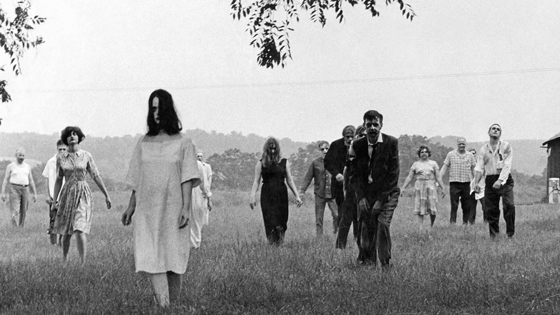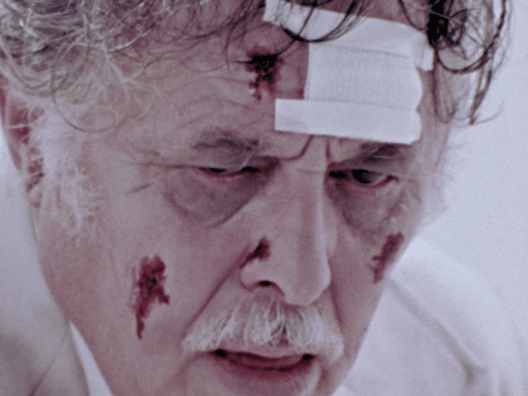In Night of the Living Dead’s final moments, the last survivor, Ben (played by Duane Jones, the first black lead in a horror film), comes out of hiding in the basement. It was the one place in the house he deemed indefensible but he somehow made it. He glances outside when shots ring out. Countrymen are on patrol, picking off zombies indiscriminately.
One of them spots Ben in the window and points. The other fires on round, killing Ben instantly.

Much has been written about that ending and its relationship with the social justice movement of the 60s, particularly Martin Luther King’s assassination. The same was true of Radio Raheem’s (played by Bill Nunn) strangulation in Spike Lee’s Do The Right Thing, which the director recut himself and put on youtube after George Floyd’s murder.
Both are currently incredibly timely and almost painfully relevant, and they both have direct ties to the pandemic through their growing panicked atmosphere. The government was largely absent in George A. Romero's franchise until the third installment. We don’t even see many real police officers in Night. The focus instead is on the makeshift militia of White country people, keeping order how they see fit.
Almost every Romero film contains biting social commentary, so perhaps it may have been unwise that the Lutheran Service Society of Western Pennsylvania tap the young filmmaker to direct their Public Service Announcement (PSA) about ageism. The same year The Crazies was released, Romero directed a lost film that’s recently been released on Shudder called The Amusement Park.

In the United Nations Sustainable Development Goal’s (SDG) blueprint, there’s much focus on still marginalized, forgotten and left behind communities around the world. And if COVID-19 threw a spotlight on one area of marginalization in the US that many may have been blind to, it is found in North American long-term care homes.
Romero was making that same argument, in a much more horrific fashion, in 1973. It was so horrific that the company that sponsored the Public Service Announcement he was tasked with producing opted never to screen it.
The Amusement Park opens as so many PSAs do, with the lead actor, Lincoln Maazel, addressing the viewer out of character. The film we’re about to see, we’re told, is about the very real problem of ageism that exists in America.
Maazel then suffers numerous examples of ageism during a day at an amusement park, where he’s constantly harassed by youths, told his eyesight cannot permit him to drive or reasonably give a witness statement to the police.
One ride is clearly a stand-in for an overcrowded retirement home. Maazel is pickpocketed by a man who plays on his good-natured spirit. Bikers beat him. His good nature at the beginning is drained and he’s reduced to a mumbling, bloodied, half-crazed old man.
Though most of his sufferings are the usual scenarios that could occur to anyone of a certain age, they’re played out to their extremes. Unfortunately, this doesn’t always translate that well. The amusement park in the film resembles the world outside, just as a nightmare carnival.
When the film was first viewed by Romero’s wife in 2017, sent to the couple by a fan and retrospective curator, she said she saw her husband’s future in it. It’s “comfort food serving something up uncomfy,” she told The Guardian.
It’s true that the film features some moments that feel very Romero-esque. An overall growing sense of panic and dread feels right at home in a film that carries his name. But The Amusement Park is still very much a public service film, like the ones you may recall from middle school.
It is a public service film that is, however, undeniably made by a talent. There’s more rhythm and style in The Amusement Park than necessary and that contributes to just how sorry you feel for Maazel. So, despite never being screened, it’s probably one of the most effectively upsetting PSAs ever filmed.
More than that, it’s also strikingly relevant given the past year, likely something of which the streaming service was keenly aware.
What you really see in The Amusement Park much more than inklings of Romero’s style is his spirit. Romero was, without a doubt, an angry filmmaker and he would regularly fund projects independently when no studio would touch it.
The Amusement Park is a public service announcement directed by an activist - a “news junkie”, as his wife described him. It’s made to make you angry and concerned about ageism and general neglect of the elderly. Had it been released at the time it was made, it’s safe to assume it would have succeeded, rather than half-succeeding as it does today due to some aspects that could be regarded as camp.
It’s an important lost work. Not as important or demanding of action as the events of Night of the Living Dead, but certainly as earnest and sincere as that film. Andrew Cuomo, the governor of New York who was criticized and blamed for mishandling the COVID-19 pandemic in nursing homes, should watch it.
Although ageism is not specifically listed as part of SDG 10 in the United Nation’s goals for a sustainable world, COVID-19 has made it clear that the problems related to elderly abuse and neglect are still very real. For further information or to learn how to donate, please visit the UN's Sustainable Development Goals page, here.
To learn more about addressing ageism, visit the World Health Organization's Combatting Ageism page, here.
